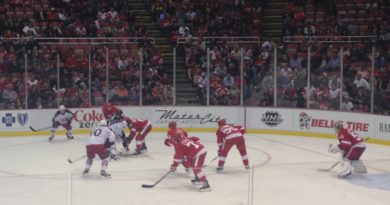To Possess The Cup, You Must Possess The Puck
One of the most important indicators of team success in the NHL is puck possession. The basic premise is simple: if you have the puck, you’re more likely to score. Corsi %, which compares a team’s (or player’s) total attempted shots (on goal + missed net + blocked) with its opponents’, has perhaps become the most popular measure of puck possession. Since its inception as a stat in 2007-08, Corsi % has been substantially more predictive of an NHL playoff series winner than home ice advantage.
In the 120 postseason match-ups over the past eight years, the team with the higher regular season Corsi % won 72 series and lost only 46 for a .610 winning percentage (two instances included teams with identical Corsi %). Going a bit further, teams with a Corsi % two or more percentage points above their opponents won a dominating 66.2% of their postseason match-ups. During that time, teams with home ice advantage won only 53.3% of their series.
This does not bode well for the Washington Capitals, this year’s Presidents’ Trophy winner. Though they became only the fourth NHL team to finish a season with at least 120 points since the Montreal Canadiens dynasty of the 1970s, they were 15th in the league in Corsi %. This, from a team that employs Alex Ovechkin, who had 95 more shots on goal than any other forward in hockey. Four of the last eight Stanley Cup winners led the NHL in Corsi % and two of the others were among the top five in the league.
Corsi %, Stanley Cup Winners, 2008-2015*
| Team | Season | Corsi % | League Rank |
| Chicago Blackhawks | 2014-15 | 54.0 | 1st |
| L.A. Kings | 2013-14 | 55.6 | 1st |
| Chicago Blackhawks | 2012-13 | 53.4 | 5th |
| L.A. Kings | 2011-12 | 53.4 | 3rd |
| Boston Bruins | 2010-11 | 50.6 | 14th |
| Chicago Blackhawks | 2009-10 | 56.2 | 1st |
| Pittsburgh | 2008-09 | 48.0 | 22nd |
| Detroit Red Wings | 2007-08 | 59.1 | 1st |
* The 2015-16 Washington Capitals have a Corsi % of 50.1, 15th in the NHL
The one team that most significantly bucked this trend was the 2008-09 Pittsburgh Penguins, the only champion in the past eight years with a lower Corsi % than Washington’s 50.1%. However, after stumbling to a mediocre record of 27-25-5 that year, Pittsburgh fired its head coach and after a few more inconsistent results, subsequently finished on a 16-2-3 run. The Penguins’ full-season stats clearly were not indicative of how well they were playing when the postseason began.
The Caps’ inability to win the majority of their face-offs in 2015-16 is another alarming issue. Though face-off % is not considered to be as important as Corsi % among the advanced stats crowd within the hockey community, it implies puck possession, has been a strong indicator of postseason success (60.8% of the 255 playoff series winners since 1998 – the last time the Capitals reached the Stanley Cup Finals – had a higher regular season face-off % than their opponents) and has more data to peruse.
The past 17 Cup winners had a median face-off % ranking of 6th in the NHL and 15 of them (88.2%) had won more than half its draws during the season. When the 2010-11 Boston Bruins took home the Cup, despite ranking only 14th in Corsi % that season, they were strong in the face-off circle (4th in the entire league). Some of the most surprising teams to reach the Finals recently include the 2001-02 Carolina Hurricanes and 2002-03 Mighty Ducks of Anaheim (each had the 7th best record in their respective conference, but led the entire league in face-off percentage) and the 8th seeded 2005-06 Edmonton Oilers and 6th seeded 2013-14 L.A. Kings, who each finished 2nd in face-offs. Washington, on the other hand, is 19th in the league this year, having won only 49.7% of its draws.
The Capitals surely have had a lot of regular season success recently, winning their division six times since 2008. However, they haven’t made it out of the second round of the playoffs in 18 years. If the Caps are going to raise the franchise’s first Stanley Cup this season, they’re likely going to have to improve their ability to control the puck. The Philadelphia Flyers, Washington’s first round opponent, had a slightly higher Corsi % than them and potential second round opponent, Pittsburgh, led the entire Eastern Conference in that stat. Meanwhile, the Kings, who haven’t won a division title in a quarter century, led the league in Corsi % for the second time in three seasons (finishing no worse than 3rd in any of the past five years) and are seeking their third NHL championship since 2012.
(photo by Keith Allison)



